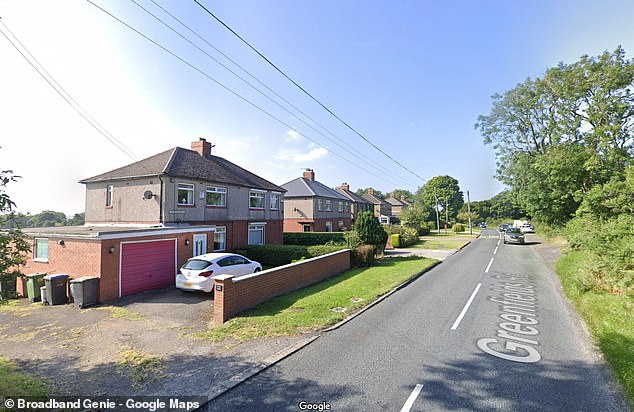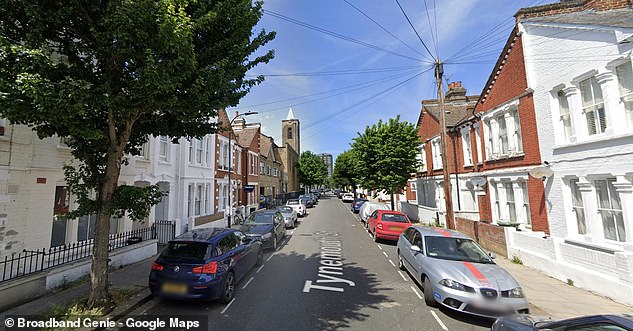Revealed: Britain’s streets with the slowest broadband – so is YOUR road on the list?
Everyone knows the frustration when you start streaming your favorite TV show or movie, but with endless buffering.
While slow broadband speeds are something many of us have to deal with, new research has revealed which streets in Britain have it the worst.
A study of Broadband genius found that Greenfields Road in Bishop Auckland has the slowest connection in Britain, with broadband speeds of just 0.35Mb (megabytes per second).
At that speed, it would take residents 34 hours to download this year’s blockbuster hit Inside Out 2.
For comparison, the fastest street in Britain is Tynemouth Street in London, where occupants receive speeds of 921.76 MB – 2,634 times faster than Greenfields Road.
To find out which streets had the best and worst connections, Broadband Genie reviewed 207,000 speed tests from across the UK.
They found that the average broadband speed for uploading and downloading in Britain was 81.97MB, but in many places they fell well below this level.
Alex Tofts, strategist at Broadband Genie, said: ‘Broadband customers should not have to tolerate slow broadband, especially when the majority of providers continue to increase prices for customers every year.’
Research from Broadband Genie has revealed the streets with the slowest and fastest broadband connections across Britain

Greenfields Road in Bishop Auckland (pictured) had the slowest connection of anywhere in Britain, with broadband speeds of just 0.35Mb. At this speed, it would take 34 hours to download Inside Out 2
The street with the second slowest connection is Collingdle Road, Northampton with speeds of just 0.47Mb.
In third place is Southcote Farm Lane in Reading, where residents experience broadband speeds of 0.61Mb, followed closely by Water Lane and Oakham in fourth place with a connection speed of just 0.62Mb.
Although London is home to the fastest-connected street in Britain, it is also home to one of the slowest.
Barrowgate Road comes in at number five with a broadband speed of 0.67Mb – just five miles from Britain’s best connected street.
For reference, Ofcom’s Universal Service Obligation entitles customers to request a minimum connection speed of just 10Mb – almost 20 times what some customers achieve on the slowest streets.
On the other hand, people living in Tynemouth Street, London enjoy the fastest speeds in the UK at 921.76 MB.
At that speed, residents should be able to download Inside Out 2 in just 46 seconds.
In second place was Bloxworth Close, Wallington with 910.10 Mb, followed by Lumsdale Crescent, Matlock in third place with a connection speed of 886.32 Mb.

Britain’s best broadband connection was found on London’s Tynemouth Street (pictured), where residents received broadband speeds of 921.76Mb – 2,634 times faster than Greenfields Road
Saxon Dale, Leicester clocks the UK’s fourth fastest broadband speed at 823.98Mb, while residents of Moatview Park, Belfast in fifth place enjoy speeds of 794.34Mb.
However, according to Broadband Genie, those who experience slower speeds don’t necessarily have to put up with their unreliable connection.
Mr Tofts says: ‘If you haven’t renewed your broadband contract for more than two years, you can probably get a faster deal at the same or lower cost than what you’re currently paying.’
Of the speed tests assessed by Broadband Genie, 57,399 locations in the UK do not meet Ofcom’s Universal Service Obligation for connection speeds.
Mr Tofts said: ‘The majority of widely available broadband providers have signed up to Ofcom’s Broadband Speed Code of Practice.
‘If your provider cannot resolve the problem within 30 days, you can cancel your contract free of charge.’
Even on Britain’s slowest streets, most have the option to upgrade to a faster connection.
Of the ten slowest streets, nine have access to ultra-fast broadband of at least 30Mb, while eight have access to ultra-fast broadband of 300Mb and above.

Broadband Genie says most customers won’t have to put up with slow connections, as 80 percent of UK households have access to Gigabit-capable broadband with speeds of at least 1,000Mb (stock image)
Only Greenfields Road and Water Lane cannot offer residents speeds of at least 300Mb.
In Britain, 80 percent of households can connect to Gigabit broadband at speeds of 1,000Mb.
Similarly, 62 percent have the option of using full fiber broadband, but this drops to just 46 percent in rural areas.
It’s important to note that connection speed can be affected by other factors, such as router placement and Wi-Fi strength.
However, this suggests that many broadband customers could get a better deal.
“No bill payer or internet user should suffer in silence,” Tofts said.
‘If you notice that your broadband is consistently underperforming and you cannot resolve the problem yourself, please contact your internet service provider.’
